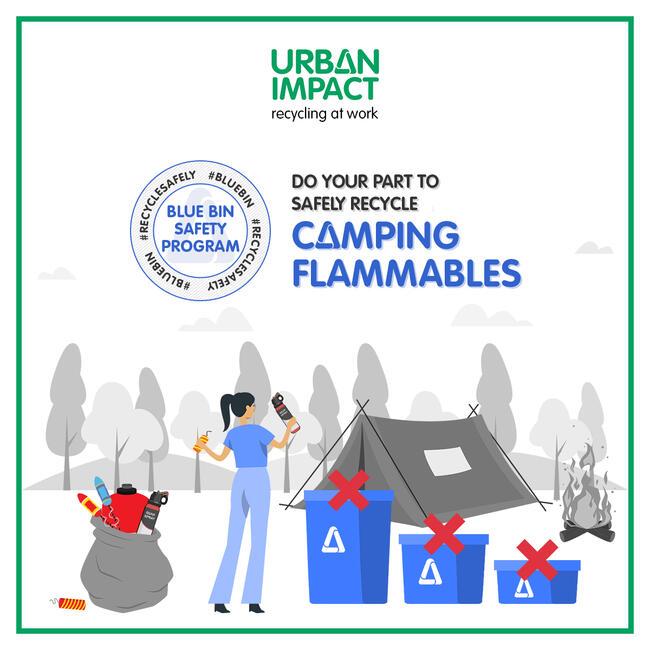- Log in to post comments

For outdoor enthusiasts who love to camp, this blog is for you. Welcome to the second article in our 3-part series: Blue Bin Summer Safety Recycling Program.
Summer is the perfect time to get outside and enjoy British Columbia’s beautiful lakes, forests, and mountains. With long summer days, cool lakes for a swimming, and cookouts, camping is a favourite summertime activity.
Regardless of the weather, there is no better time to be vigilant about fire safety and properly recycling flammables items, including camping fuel, fireworks and bear spray.
Compressed Gas
All compressed gas is a hazardous material. In our first blog, we explored the hazards of compressed gas tanks, shared a list of compressed gas types, and outlined the proper way to safely recycle these items.
Camping Fuel
Pack it in, pack it out and dispose of it safely. Cleaning up your campsite is a must, as is making sure you properly dispose of your camping fuel. Camping fuel, fluid, and containers do not get thrown into your household waste or your #bluebin. Camping fuel and fluid is a flammable material that can easily explode and catch on fire while being transported in our trucks or processed in our facilities.
Please keep yourself and our workers safe by properly and safely disposing of camping fuel. To find a depot where you can drop-off your camping fuel canisters, please visit https://rcbc.ca/ or call the RCBC hotline at 1-800-667-4321.
Fireworks
When used safely, fireworks can create a magical campfire evening. However, just as we need to be careful when setting off fireworks, we also need to be careful when disposing of them. Fireworks, when incorrectly disposed of, can be dangerous to you, the individuals who handle your waste, and the environment.
Fireworks are flammable. They have a high risk of starting fires or exploding when processed in recycling trucks or facilities. Fireworks do NOT go in your blue bins.
To properly dispose of fireworks:
- Soak used fireworks in water over night and then put them in your waste bin.
- Drop off unused fireworks at your local police or RCMP station.
- Always call ahead.
- Do not bring them into the station.
- For more information on firework disposal , please call the Recycling Hotline at 604-732-9253 or 1-800-667-4321, Monday to Friday, 9am to 4pm.
Bear Spray
It is common to see wild animals, especially bears, in British Columbia wilderness spaces. Taking preventative measures, like keeping food secure and far off the ground is one of the best ways to keep bears and other creatures from entering your camp site. Should you need it, bear spray is a useful and often successful tool for deterring agitated bears.
Bear spray canisters and aerosol cans, with a poison, flammable, and corrosive symbol on them, are not accepted for recycling.
It is important to transport these items safely. Do not leave them in a hot vehicle and follow the safe disposal method below.
Bear spray does NOT belong in your #bluebin! These pressurized canisters contain hazardous materials and should never be thrown in household garbage or general recycling. Improper disposal of bear (and pepper) spray can harm workers at our recycling and disposal facilities.
How to safely dispose of used or expired bear spray canisters:
1. Make sure to spray out all the contents in a safe location, outdoors, and away from people.
2. Secure the trigger lock with a zip tie.
3. Put the empty canister in a heavy-duty zip lock bag.
4. Contact the BC Recycling hotline for instructions before taking canisters to your local landfill or transfer station.
Camping Safety Tips
Campfires can be risky all year round. Warmer and drier weather increases the risk of forest fires.
Understanding Open Burning
Before going camping or starting a camp fire, please ensure you know the current burning regulations and campfire bans. British Columbia has three categories for open burning.
- Category 1: Campfires no bigger than 0.5 metres high by 0.5 metres wide, used for recreations purposes and First Nation people for a ceremonial purposes.
- Category 2 and 3: Burn pile, burn barrels, other types of fire with specific size restrictions, fireworks, firecrackers and sky lanterns and more.
Never Use Gas to Start a Campfire
Don’t use any flammable or combustible liquids. Gasoline is far too flammable to use for lighting fires. Use proper firelighters and charcoal. Keep your campfire small, so it’s easier to control.
Never Leave a Fire Unattended
Don’t let kids play anywhere near a campfire. Always extinguish the campfire prior to leaving the campsite or before you go to sleep. Sift the cold ashes through your hands to ensure the fire is 100 percent extinguished.
Never Leave Charcoals Warm
It’s critical to let the charcoal and their ashes cool for at least 48 hours before disposing of them. Dumping charcoal that is still warm can lead to fires in public parks and residential areas. Pour water on the charcoals and ensure they are completely cool by running your hand through them.
Take Precautions to Avoid a Wildfire
Dry vegetation can quickly spark into a fire. Along with keeping a close eye on campfires, do not discard lit cigarettes or matches on the ground or into vegetation.
Make the most of your summer camping trip this year, be safe, and watch out for bears!
